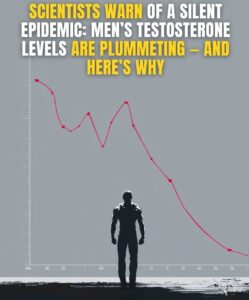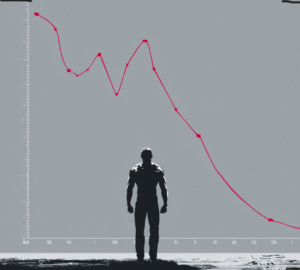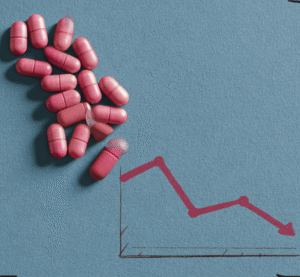The Silent Crisis: Why Men’s Testosterone Levels Are Falling — And What’s Behind It

A quiet but alarming health crisis is unfolding across the world — one that is affecting men of all ages, yet rarely makes headlines. Scientists are raising the alarm about a dramatic and consistent drop in testosterone levels, and the implications go far beyond physical health.
What used to be considered a natural age-related decline is now being observed in much younger men. Remarkably, a 22-year-old man today may have significantly lower testosterone than his grandfather had at middle age. And this change is raising serious concerns among health experts.
A Troubling Trend Backed by Science
A pivotal study published in 2007 by the Journal of Clinical Endocrinology and Metabolism revealed that American men’s testosterone levels have been declining by roughly 1% every year since the 1980s — a trend that cuts across all age groups, health statuses, and ethnicities.
That means a 40-year-old man today could have 25% less testosterone than a 40-year-old man two decades ago.
This isn’t just a U.S. issue — similar patterns are being documented in Europe, Asia, and Australia. Researchers worldwide are beginning to understand that this is a global biological shift.
Why Testosterone Is So Important
Testosterone is often reduced to its role in male libido, but it does far more. This vital hormone is key to:
-
Building and maintaining muscle mass
-
Preserving bone strength
-
Regulating mood, motivation, and cognitive clarity
-
Supporting heart and metabolic health
-
Ensuring reproductive and sexual function

When testosterone drops too low — a condition known as hypogonadism or “Low T” — it’s been associated with fatigue, depression, obesity, reduced fertility, brain fog, and even early mortality. Simply put, testosterone is essential for men’s vitality, resilience, and well-being.
What’s Driving the Decline?
There’s no single factor behind the global dip in testosterone. Instead, it appears to be the outcome of multiple modern-day influences combining into a perfect storm. Here are some of the leading culprits:
1. Disruptive Chemicals in Everyday Life
Hormone-disrupting substances like BPA and phthalates, commonly found in plastics, personal care items, and household cleaners, interfere with testosterone production. These chemicals mimic estrogen and confuse the body’s endocrine system.
Even more disturbing: microplastics have now been detected in human blood, semen, and testicular tissue — further implicating them in reproductive and hormonal damage.
2. Excess Fat and Inactivity
Abdominal fat produces estrogen and suppresses testosterone. Today’s sedentary lifestyle, along with poor diet and minimal muscle-building activity, has created a hormonal imbalance that many men don’t even realize they have.

3. Sleep Deprivation and High Stress
The majority of testosterone is produced during deep, restorative sleep. Chronic sleep loss and constant stress trigger the hormone cortisol, which actively inhibits testosterone synthesis.
4. Poor Nutrition
Highly processed foods — high in sugar, refined grains, seed oils, and low in crucial minerals like zinc and magnesium — are directly harming hormone production. Men’s diets today are lacking the raw materials needed to make and maintain healthy testosterone levels.
5. Too Much Screen Time
Exposure to screens late into the evening disrupts melatonin, the sleep-regulating hormone. Poor sleep means less testosterone. Blue light from devices may also throw off circadian rhythms, which are closely tied to hormonal cycles.
The Emotional Toll
The physical effects of low testosterone are serious — but the psychological impact may be even more devastating. Men with declining testosterone often report:
-
Low motivation and drive
-
Sexual dysfunction at younger ages
-
Emotional flatness or anxiety
-
A feeling of disconnection or lost identity
This is more than a medical issue — it reflects a deeper cultural challenge that touches on masculinity, purpose, and mental health.
A Public Health Emergency Hiding in Plain Sight
Unlike other health conditions, the testosterone decline rarely gets public attention. Why? Because it involves uncomfortable questions about masculinity, modern living, and societal values. Many men suffer in silence, assuming their exhaustion and symptoms are normal.
But this crisis is gaining urgency. Experts like Dr. Shanna Swan — an epidemiologist and author of Count Down — describe it as a slow-moving disaster with far-reaching consequences for fertility, family life, and long-term health.
What Men Can Do Today
While not every factor is within personal control, there are lifestyle choices that can help reverse or prevent testosterone decline. Here’s where to begin:
1. Strength Training Is Key
Lifting weights — especially compound exercises like squats and deadlifts — stimulates testosterone production. Just 3–4 sessions a week can rebuild muscle, improve mental clarity, and jumpstart hormone health.
2. Sleep Like Your Life Depends On It
Aiming for 7–9 hours of uninterrupted, high-quality sleep is one of the most powerful ways to support testosterone levels. Turn off screens before bed, keep the room cool and dark, and avoid caffeine late in the day.
3. Avoid Plastics and Heat
Plastics leach hormone-altering chemicals when exposed to heat. Switch to glass or stainless-steel containers, especially for hot food and drinks. Cut down on plastic use in general — it’s more damaging than most people realize.
4. Choose Testosterone-Friendly Foods
Eat nutrient-rich whole foods — such as eggs, grass-fed meat, wild-caught fish, nuts, seeds, dark leafy greens, and healthy fats. These nourish the body and provide the building blocks for healthy hormones.
5. Limit Sugar and Alcohol
Both sugar and alcohol disrupt hormonal balance. Reducing their intake can dramatically improve testosterone levels and overall vitality.
6. Get Morning Sun, Cut Nighttime Blue Light
Natural sunlight stimulates vitamin D, which supports testosterone. Aim for 15–30 minutes of sun exposure daily. At night, avoid blue light to protect melatonin and sleep quality.
7. Eliminate Hidden Toxins
Many grooming and cleaning products contain xenoestrogens. Switch to natural alternatives, filter your water, ventilate your living space, and use toxin-free household products.
Final Thoughts
The drop in testosterone is not just a men’s health issue — it’s a reflection of how modern life is impacting the human body. The food we eat, the air we breathe, our daily habits, and our emotional stress all influence hormonal health.
We’re at a crossroads. The decline in testosterone doesn’t have to be inevitable. But reclaiming hormonal health will require awareness, intention, and action.
This isn’t about chasing outdated ideas of masculinity — it’s about reclaiming vitality in a world that often drains it. The question isn’t just “What’s happening to men?” — it’s “What are we willing to do about it?”